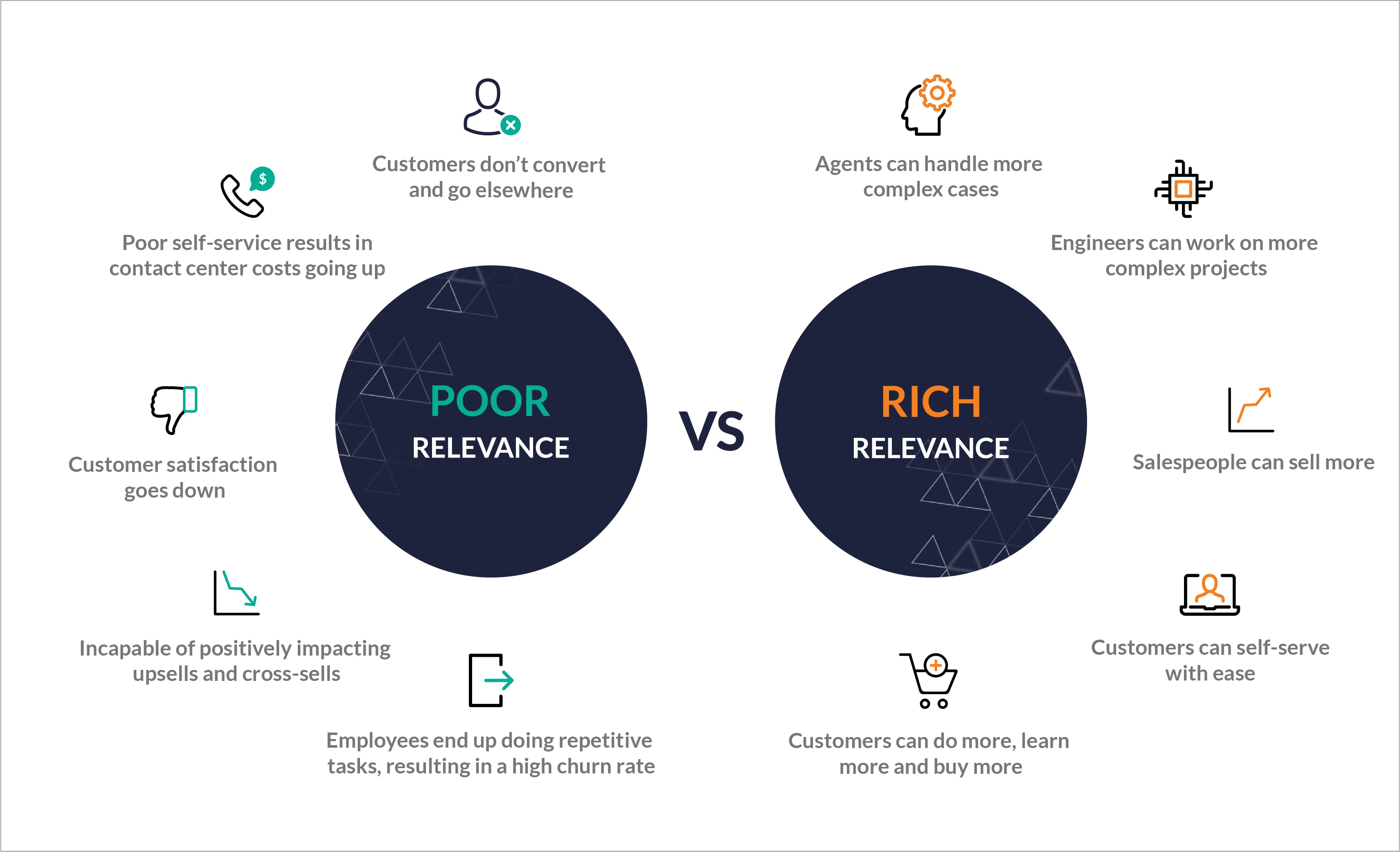“By 2020, 51% of consumers and 75% of business buyers expect companies to anticipate their needs and make relevant suggestions.” – Huffington Post
Delivering relevant interactions is no longer optional. Contextual and personalized digital experiences for customers, partners and employees alike are now mandatory for companies to survive in the digital age and the only way to achieve such experiences at scale is by putting AI at the core of your digital transformation.
According to The Gartner 2018 CEO and Senior Business Executive Survey, CEOs are concentrated on enhancing their company structure to intensify their digital transformation initiatives. However, studies consistently show that less than 1 in 10 leaders truly has a transformational mindset. The reality is that many executives don’t know the cost of poor relevance to their organizations, are not yet familiar with the results relevant-rich experiences can yield and are therefore building their digital transformation strategy on partial information.
We’d like to change that by showing you 5 business benefits of relevant-rich experiences and offering supportive assets that will serve as valuable guidance on your journey:

Let’s first take a look at what being a ‘relevant’ organization means. Relevance is the combination of context, content and intent. It’s about delivering the best information, at the right place, the moment (and even before) it’s needed — to your customers, partners and employees. Relevant interactions help to build trust, loyalty and satisfaction among your customers, they empower your employees to make the most informed business decisions and fuel the growth of your organization. Achieving relevance starts by implementing AI to unify your collective company knowledge, from across your information silos, into a single, easy-to-use, unified index. Let’s take a deeper dive into how relevant interactions can have a significant impact on your bottom line and ways you can use AI-powered search and recommendations across your organization to drive the success of your digital transformation initiative.
Customer loyalty
AI-powered search and recommendations allow your customers to self-serve, freeing your agents up to work on more complex tasks. If agent-assisted support is required, the same technology helps your agents to find the information they need to do their job better and faster. With access to relevant customer information, such as location, preferences and purchase history, they can completely personalize the experience to each individual which greatly contributes to customer loyalty and has a significant impact on NPS.
Ability to remain agile and innovative
Relevant information includes, but is not limited to, documents, internal experts and customer data, which offer a holistic view of what your customer needs are and how your organization can help. When your employees have access to such information, from across your enterprise, they are able to make more timely and informed business decisions that enable them to act quickly and identify growth opportunities. This insight is critical for your digital transformation and ensures that your engineers are prioritizing the projects that will help scale your business.
Increase in sales
Delivering content instream to sales representatives and partners enables them to accelerate revenue and productivity. When they’re equipped with salient company knowledge and the best content, given the context and intent of the prospect, they close better and faster. McKinsey states that 9.3 hours per week is wasted searching and gathering information. AI-powered search and recommendations not only allow your sales representatives and partners to reclaim that time, they can further personalize their pitch with relevant insight and bring in more revenue.
Higher customer satisfaction
Making relevant company knowledge accessible to your customers with AI-powered search and recommendations allows them to be in control of their experience. The more you can automate and empower your customers to move through their journey intuitively and autonomously, the better off you’ll be. Your customers prefer to self-serve, and when done right, you can expect a boost in case deflection, fewer calls into your contact centre and as a result, an overall reduction in the cost of your support operations.
Greater customer lifetime value
A customer’s first impression is a lasting impression. They know what they want and they’re turning to your organization to meet their needs, according to their context and intent in the moment, and on their terms. When you deliver a relevant experience from their very first touchpoint, and continue to offer value throughout their entire journey, they will come back time and time again. If you make them work too hard to find what they need, it sends a signal that you don’t know their preferences and don’t value their time. Those hard earned customers will quickly bounce off your site, likely right to one of your competitors who is ready to meet their expectations. If there’s one thing to remember it’s this: relevance = returns. Return customers drive more revenue than new customers. In fact, acquiring a new customer can cost five to twenty-five times more than retaining an existing customer. Increasing customer retention by 5% increases profits 25-95% – but you’ve got to be relevant.
Relevant interactions drive business results. Every customer, employee and partner have the power to effectively grow your organization if they find what they need when they need it. To learn more about the relevance maturity of your organization and what you can do to improve it, read our white paper, “From Relevance Laggard to Leader.”


